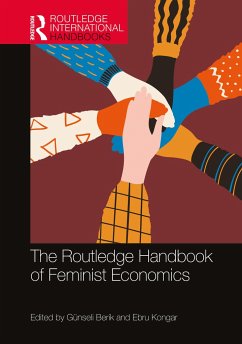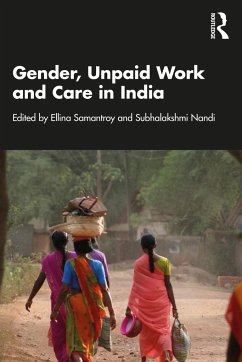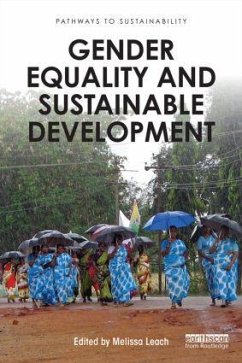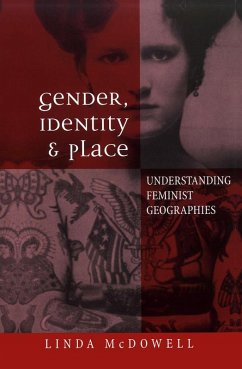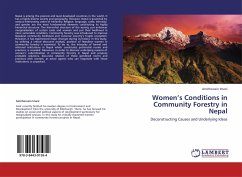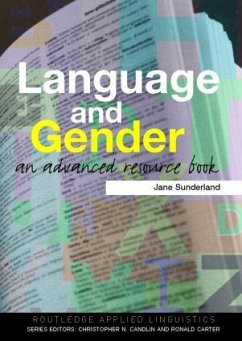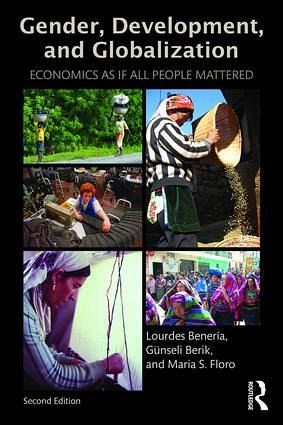
Lourdes Beneria
Broschiertes Buch
Gender, Development and Globalization
Economics as if All People Mattered
Versandkostenfrei!
Versandfertig in 6-10 Tagen
Weitere Ausgaben:

PAYBACK Punkte
24 °P sammeln!





By combining theoretical, empirical, and political perspectives and discussing cutting-edge debates around development, globalization, economic restructuring, and feminist economics, Gender,Development and Globalization presents the ultimate primer on global feminist economics.
Lourdes Beneria is Professor of City and Regional Planning and former director of the Gender and Global Change Program and of the Latin American Studies Program at Cornell University. Her work has focused on gender and development, paid/unpaid work, globalization, labor markets and structural adjustment policies, particularly in Latin America. Günseli Berik is Professor of Economics at the University of Utah, USA. Her research and teaching is in the fields of development economics, gender and development, feminist economics, and political economy of ethnicity, gender, and class. Berik is co-editor of the journal Feminist Economics. Maria S. Floro is Professor of Economics and co-director of the Program on Gender Analysis in Economics at American University. Her publications include Credit Markets and the New Institutional Economics, Women's Work in the World Economy, and articles on time allocation, unpaid work, finance, informal employment, vulnerability and poverty.
Produktdetails
- Verlag: Taylor & Francis
- Artikelnr. des Verlages: Y137421
- 2. Aufl.
- Seitenzahl: 350
- Erscheinungstermin: 23. Juli 2015
- Englisch
- Abmessung: 229mm x 152mm x 19mm
- Gewicht: 492g
- ISBN-13: 9780415537490
- ISBN-10: 0415537495
- Artikelnr.: 39595159
Herstellerkennzeichnung
Libri GmbH
Europaallee 1
36244 Bad Hersfeld
gpsr@libri.de
"This new edition of a book that has already proved invaluable for those interested in gender and globalization from a development perspective will be on interest to an even wider audience. It provides an overview of the impact of globalization on gender relations in different regions of the world, expanded and updated to consider recent financial crisis. It synthesises the key contributions of feminist analysis in the field of economics, exposing both stated and hidden assumptions through which it is able to construct a world that is apparently free of injustice. And it reminds us that the politics of redistribution must be combined with the politics of recognition in feminist efforts to create a more just and sustainable
Mehr anzeigen
international order."-Naila Kabeer, London School of Economics and Political Science
"Lourdes Benería, Günseli Berik and Maria Floro provide an indispensable compendium of the research on gender and development and a comprehensive road map to feminist economics thinking today. The authors unmask the neoliberal, market-driven policy agenda that has dominated development policy for decades and offer feminist, people-driven alternatives that promote democracy, economic well being and ecologically sustainable development." - Randy Albelda, Professor of Economics, author of Economics and Feminism: Disturbances in the Field
"Drawing on the latest thinking in feminist economics, this book provides a powerful critique of neoliberal globalization as well as of the way gender has been mainstreamed in development policy. It is the ideal text for a course in gender and development, a provocative complementary reading for courses in development studies more generally, and pivotal to all those concerned with building a more gender equitable society."- Carmen Diana Deere, Distinguished Professor of Latin American Studies and Food & Resource Economics, University of Florida
"Gender, Development, and Globalization is a remarkable book. It encompasses and highlights the best of innovative thinking in the field of economics. Policymakers will benefit from novel framework for promoting human well-being. The authors go well beyond the boundaries of traditional economics to consider care work, the environment, and the challenges posed by class, gender and race inequality. This revised edition could not be more timely, in a world in which so many are seeking new ideas on how to understand and address problems of growing inequality, tendencies to economic stagnation, and intergroup conflict."- Stephanie Seguino, University of Vermont
"Gender, Development, and Globalization is an excellent introduction to critical feminist analysis of the changing patterns of global employment, wealth, and well-being. Particularly concerned with the state of the world's workers, and among them, the most disadvantaged, it makes strong contributions to pressing debates about inequality, neoliberalism, unpaid labor, and the goals and design of development policy."- Julie A. Nelson, University of Massachusetts, Boston"
This book is a very rich and up-to-date source for teaching in the areas of globalisation and gender and development. Its theories range from the recognition of women's paid and unpaid economic roles in the 1980s to the human rights based framework developed in response to an instrumental policy approach to the MDGs in the new millennium. In particular, the book signals a new developmentalism in which heterodox economics engages with feminism and in which social movements push an agenda based on social solidarity practices across the world."- Irene van Staveren, International Institute of Social Studies of Erasmus University Rotterdam
"Gender, Development and Globalization: Economics as if All People Mattered is a crucial reading for scholars and students from all disciplines and for those in charge of policies for the well-being of ordinary men and women. Anyone who wants or needs to delve into the workings of the economy, the market, and the making of current income inequalities and social polarization, should read it." Mercedes González de la Rocha, Social Anthropologist, (CIESAS)
Praise for the Previous Edition:
"Lourdes Beneria is one of the leaders of thought on gender economics as well as development studies. In this wonderfully interesting book, Beneria discusses and critically assesses the recent trends in the analysis of gender and development issues. It is an accessible and very engaging account and enlightens both the fields as well as the challenges of globalization in the contemporary world." - Amartya Sen, author of Development As Freedom and Poverty and Famines
"Behold 'Davos Man,' symbol of the international elite that meets regularly in luxurious fortresses to advance its global interests. This book strips off his gilded three-piece suit to reveal a lifeless, brittle piece of molded plastic. Lourdes Beneria's feminist deconstruction of mainstream economics urges us to look in new directions toward a more generous, sustainable, and democratic model of global development." -Nancy Folbre, author of The Invisible Heart: Economics and Family Values
"Beneria ideas about what to do if we agree that "we cannot continue today on these lines" offer a positive sense that another way of thinking, at least, is already possible... Informative reviews of 1) the history of feminist influences on the field of economics, 2) the dominant ideas shaping development thinking during the late 20th Century and 3) the literature on labor dimensions of globalization and industrial restructuring make this book additionally useful as a reference." - Journal of Planning Education and Research, Gwen Urey
"Lourdes Benería, Günseli Berik and Maria Floro provide an indispensable compendium of the research on gender and development and a comprehensive road map to feminist economics thinking today. The authors unmask the neoliberal, market-driven policy agenda that has dominated development policy for decades and offer feminist, people-driven alternatives that promote democracy, economic well being and ecologically sustainable development." - Randy Albelda, Professor of Economics, author of Economics and Feminism: Disturbances in the Field
"Drawing on the latest thinking in feminist economics, this book provides a powerful critique of neoliberal globalization as well as of the way gender has been mainstreamed in development policy. It is the ideal text for a course in gender and development, a provocative complementary reading for courses in development studies more generally, and pivotal to all those concerned with building a more gender equitable society."- Carmen Diana Deere, Distinguished Professor of Latin American Studies and Food & Resource Economics, University of Florida
"Gender, Development, and Globalization is a remarkable book. It encompasses and highlights the best of innovative thinking in the field of economics. Policymakers will benefit from novel framework for promoting human well-being. The authors go well beyond the boundaries of traditional economics to consider care work, the environment, and the challenges posed by class, gender and race inequality. This revised edition could not be more timely, in a world in which so many are seeking new ideas on how to understand and address problems of growing inequality, tendencies to economic stagnation, and intergroup conflict."- Stephanie Seguino, University of Vermont
"Gender, Development, and Globalization is an excellent introduction to critical feminist analysis of the changing patterns of global employment, wealth, and well-being. Particularly concerned with the state of the world's workers, and among them, the most disadvantaged, it makes strong contributions to pressing debates about inequality, neoliberalism, unpaid labor, and the goals and design of development policy."- Julie A. Nelson, University of Massachusetts, Boston"
This book is a very rich and up-to-date source for teaching in the areas of globalisation and gender and development. Its theories range from the recognition of women's paid and unpaid economic roles in the 1980s to the human rights based framework developed in response to an instrumental policy approach to the MDGs in the new millennium. In particular, the book signals a new developmentalism in which heterodox economics engages with feminism and in which social movements push an agenda based on social solidarity practices across the world."- Irene van Staveren, International Institute of Social Studies of Erasmus University Rotterdam
"Gender, Development and Globalization: Economics as if All People Mattered is a crucial reading for scholars and students from all disciplines and for those in charge of policies for the well-being of ordinary men and women. Anyone who wants or needs to delve into the workings of the economy, the market, and the making of current income inequalities and social polarization, should read it." Mercedes González de la Rocha, Social Anthropologist, (CIESAS)
Praise for the Previous Edition:
"Lourdes Beneria is one of the leaders of thought on gender economics as well as development studies. In this wonderfully interesting book, Beneria discusses and critically assesses the recent trends in the analysis of gender and development issues. It is an accessible and very engaging account and enlightens both the fields as well as the challenges of globalization in the contemporary world." - Amartya Sen, author of Development As Freedom and Poverty and Famines
"Behold 'Davos Man,' symbol of the international elite that meets regularly in luxurious fortresses to advance its global interests. This book strips off his gilded three-piece suit to reveal a lifeless, brittle piece of molded plastic. Lourdes Beneria's feminist deconstruction of mainstream economics urges us to look in new directions toward a more generous, sustainable, and democratic model of global development." -Nancy Folbre, author of The Invisible Heart: Economics and Family Values
"Beneria ideas about what to do if we agree that "we cannot continue today on these lines" offer a positive sense that another way of thinking, at least, is already possible... Informative reviews of 1) the history of feminist influences on the field of economics, 2) the dominant ideas shaping development thinking during the late 20th Century and 3) the literature on labor dimensions of globalization and industrial restructuring make this book additionally useful as a reference." - Journal of Planning Education and Research, Gwen Urey
Schließen
Für dieses Produkt wurde noch keine Bewertung abgegeben. Wir würden uns sehr freuen, wenn du die erste Bewertung schreibst!
Eine Bewertung schreiben
Eine Bewertung schreiben
Andere Kunden interessierten sich für




